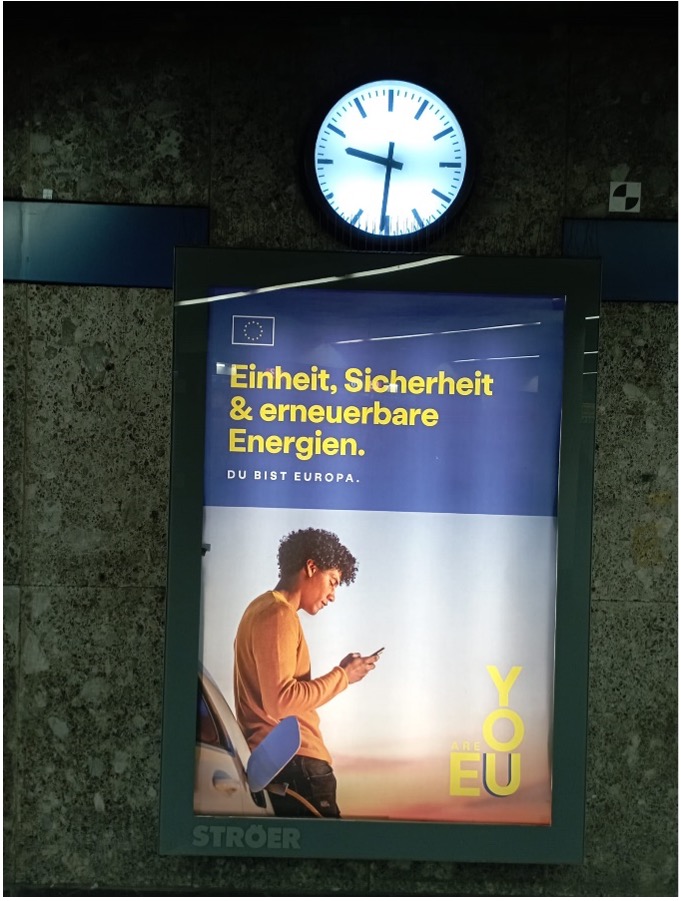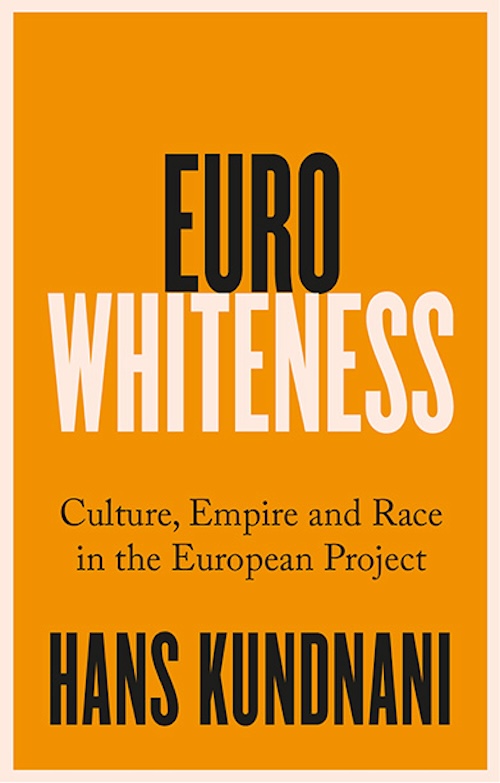Review of Hans Kundnani, Eurowhiteness: Culture, Empire and Race in the European Project. London: Hurst & Co., 2023.
Munich (Special to Informed Comment; Feature) – What does it mean to be European? This is a complex but legitimate question. Still, one is unlikely to find an answer to the conundrum in the numerous billboards paid for by the EU Commission in Munich and many other European cities under the motto “You are Europe”.
There are four different models of EU-funded billboards. They all put focus on three different concepts, which give us a total of twelve ideas: freedom, peace, energy independence, democracy, diversity, climate protection, stability, respect, green transition, unity, security, and renewable energy. In every model of the billboard, there is a different single individual in the picture alongside a reference to renewable energies, with an electric car, solar panels, and a windmill appearing.

Billboard at Giselastrasse Subway Station. Munich, November 21, 2023.
By examining the billboards, we understand that the message the EU tries to convey is that the EU is a value-based community. The promotional site of this new campaign calls Europeans to “stand up for our values, to protect your and your family’s future, the climate and the planet.” But one does not need to do more than search online “EU billboard” to see how fragile these values can be. Because the billboards that are catching the headlines in Europe are not the ones promoted by the EU Commission but those found in one particular EU country, Hungary, and paid by Fidesz, the political party of the Hungarian Prime Minister Viktor Orban.
These billboards depict President of the EU Commission Ursula von der Leyen alongside Alex Soros, the son of the Hungarian-born billionaire and philanthropist George Soros, under the slogan “Let’s not dance to their tunes”. This is not a first for Orban’s party, as they had already been responsible for similar billboards in 2019 featuring von der Leyen’s predecessor Jean-Claude Juncker and George Soros.
In the recently published book “Eurowhiteness: Culture, Empire and Race in the European Project”, Hans Kundnani, an associate fellow at Chatham House, examines from a critical perspective how the EU has come to define itself and its values. The EU is often understood as a project united by the rejection of nationalism, which led to the horrors of the Second World War and the Holocaust.
This discourse can be found in, for instance, the address to the European Parliament in November 2018 by then-German Chancellor Angela Merkel. Merkel said that “nationalism and egoism must never have a chance to flourish again in Europe. Tolerance and solidarity are our future.” Kundnani begs to differ and presents a more complex picture of the EU, writing that “we should think of the EU as an expression of regionalism, which we should in turn think of as being analogous to nationalism—something like nationalism but on a larger, continental scale.”[1]
Internal borders and nationalistic competition between EU countries might have lost importance, but the borders and adversarial relations between Europe and the rest of the world remain there and have even hardened. It is difficult to disagree with Kundnani when we see how, despite their internal differences on the topic, EU countries are currently discussing how to further cooperate to establish harsher EU policies towards migrants and asylum seekers.
Kundnani’s key idea, namely that the EU represents a form of regional nationalism, helps understand the current rise of the European far-right from a different perspective. Increasingly, “the far right in Europe does not simply speak on behalf of the nation against Europe, but also on behalf of Europe”, notes Kundnani. Contrary to what many would think, the far-right can also be pro-European in its own specific way.
On December 3, European far-right parties held an international meeting in Florence, Italy, to co-ordinate in advance of the European elections to be held in June 2024. During the meeting, Reuters reports, “Jordan Bardella, president of Marine Le Pen’s National Rally party, won applause speaking in Italian and saying that Europe cannot become a “5-star hostel for Africa”, and linking mass immigration to violence and crime.”[2]
Instead of hiding his Italian family background, which would have made sense from a French ultra-nationalist perspective, Bardella used his Italian language skills to appeal to his audience in Florence and demonize the non-European as violent and criminal. Inner European borders lose part of their importance when the main frame of reference is civilizational. And this is increasingly the case. European far-right parties share a belief in racist doctrines such as the ‘Replacement Theory’, which posits that white people around the world are being replaced by nonwhite people.
Kundnani argues that the regional nationalism we currently find in the EU is largely the result of its history. At the time the Treaty of Rome was signed in 1957 establishing the European Economic Community (EEC), two of the six founding members – Belgium and France – still had colonies. This is what Kundnani calls the EU’s “original sin”.[3]
More important than that, however, is probably the way the EEC and its successor organizations, the European Community and the European Union, failed to come to terms during the following decades with this legacy of European colonialism and violence. Consequently, “the emerging official narrative of the EU was based on the internal lessons of European history, i.e. what Europeans had done to each other, but not the external lessons, i.e. what Europeans had done to rest of world—in particular colonialism.”[4]
There was an important sense, however, in which European regionalism could promote civic values. Kundnani mentions how many who described themselves as pro-Europeans saw “the social market economy and the welfare state as a more humane alternative to a more brutal American form of capitalism.”[5] Such an understanding of being European, which Kundnani names ‘civic regionalism’, reached its high-water mark in the decades following the Second World War. It became increasingly difficult to sustain in the face of the neo-liberalism of the 1980s and 1990s and the austerity measures imposed by the EU after 2008 during the Eurozone crisis.
This neo-liberal turn, and the increasing role of the EU in setting economic policies with little democratic oversight, argues Kundnani, was partly responsible for the rise in Euroscepticism. If the Eurozone crisis split the EU in terms of the better-off North versus the struggling South, the sudden increase in the arrivals of migrants and asylum seekers to Europe in 2015 led to important divergences between a more welcoming West and a closed-doors East. This double split, according to Kundnani, undermined the EU’s self-confidence. During the last years, the civic regionalism of the social market economy and the welfare state has receded even further in favor of a more exclusionary understanding of what it means to be European.
In this context, “centrists began to adopt far-right tropes and integrate them into the EU itself”.[6] Examples of this dynamic are abundant. After becoming President of the European Commission, the center-right politician Ursula von der Leyen announced the creation of a Commission Vice-Presidency for protecting ‘the European way of life’, which would include responsibility for topics such as migration. Von der Leyen, facing outrage, substituted the word ‘protecting’ for ‘promoting’, but little else changed. Meanwhile, the EU foreign policy chief Josep Borrell, from the Socialist Spanish Party, pronounced a speech in 2022 where he defined Europe as a garden and added that “most of the rest of the world is a jungle, and the jungle could invade the garden”.
There are two significant weaknesses in “Eurowhiteness”. The first one is related to the very title of the book. Kundnani explains that “Eurowhiteness” is an “ethnic/cultural version of European identity”[7] but does not develop the concept extensively enough to justify why the term has such prominence in the title. The second shortcoming is the lack of a proper concluding chapter in the book. The last chapter deals with Brexit instead of pointing out some key ideas on the way forward if we want an EU that strengthens civic regionalism.
Catherine de Vries, the dean of international affairs at Bocconi University, has recently published an op-ed for the Financial Times that quotes Kundnani’s work and offers some significant reflections regarding the problems identified in “Eurowhiteness”. Reflecting on the recent electoral victory in the Netherlands of the far-right Party for Freedom (VVP) led by Geert Wilders, de Vries explains that we would be mistaken if we seek to understand the success of the European far-right only through its anti-migration rhetoric.
De Vries notes that “research has shown that cuts to public services play an important role in explaining the rise of the far right”. “Concerns about reduced access to public services”, she adds, “leads people to question the extent to which their government cares about people like them. Waning public services may also fuel immigration concerns out of fear of more congestion and overcrowding.”[8]
Kundnani’s book represents a major contribution to a better understanding of how nationalism, far from fading away with the emergence of a European Union that now covers most of Western and Central Europe, has adopted a new shape in the form of exclusivist European nationalism. “Eurowhiteness” is not without its faults, but it offers an intellectually stimulating and policy-relevant departing point to any discussion about the future of Europe.
[1] Hans Kundnani, Eurowhiteness: Culture, Empire and Race in the European Project (London: Hurst & Co., 2023), p. 3.
[2] Armellini, Alvise. “Far Right Parties Eye Gains in next Year’s EU Parliament Elections.” Reuters, December 3, 2023. https://www.reuters.com/world/europe/far-right-parties-eye-gains-next-years-eu-parliament-elections-2023-12-03/.
[3] Kundnani, Eurowhiteness: Culture, Empire and Race in the European Project, p. 75.
[4] Ibid., p. 94.
[5] Ibid., p. 84.
[6] Ibid., p. 126.
[7] Ibid., p. 6.
[8] De Vries, Catherine. “Migration Crackdowns Won’t Help Europe’s Moderate Right.” Financial Times, December 4, 2023. https://www.ft.com/content/6b3e2ee0-189e-47f4-95df-375d79dd6266.



 © 2026 All Rights Reserved
© 2026 All Rights Reserved